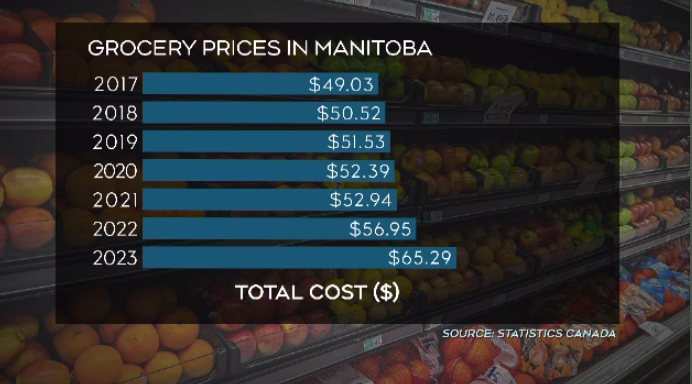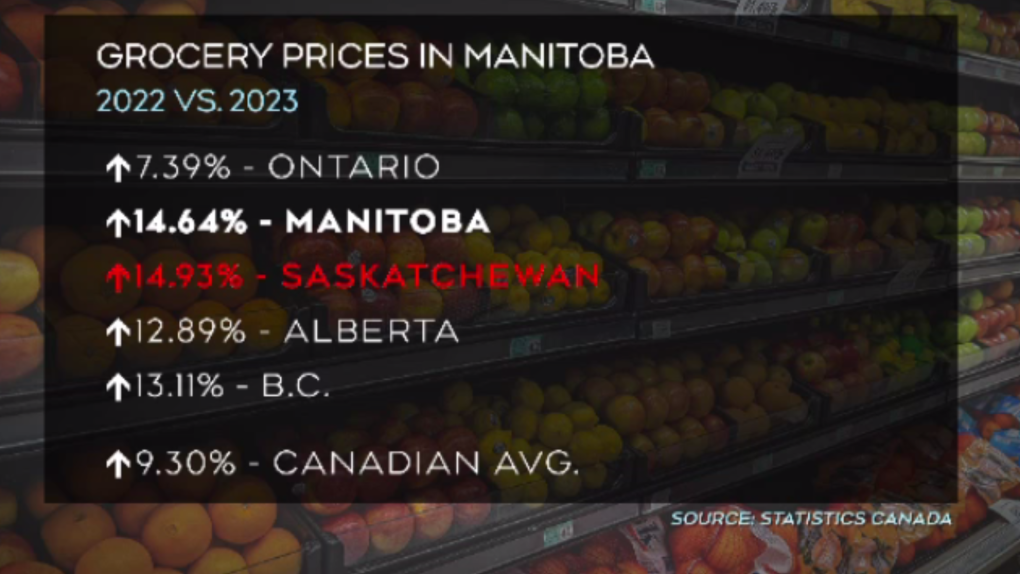'It could have been a lot worse': Manitoba to see higher grocery store prices in 2023
Rising food prices and higher grocery store bills are going to keep increasing for Manitobans in the year ahead albeit at a slower pace, researchers predict.
It is a bit of relatively good news for Manitoba consumers after a experiencing some of the sharpest increases in food prices among central and western Canadian provinces.
HOW MUCH HAS MANITOBA'S FOOD PRICES INCREASED?
In January 2017, the average Manitoban could purchase a kilogram of beef and chicken, a pack of bacon, one litre of milk, some butter, a dozen eggs, bread, cereal and a mix of a few fruits and vegetables for $49.03, according to federal data on monthly average retail prices for food.
That sum edged up to $50.52 at the same time the next year, an increase of just below three per cent.
Manitoba’s food prices would follow a similar trajectory in the three following years, with the total sum of the same set of goods increasing anywhere from two to three per cent, which is roughly in line with historical inflationary trends.
 (Graphic: CTV News Winnipeg/Data: Statistics Canada)
(Graphic: CTV News Winnipeg/Data: Statistics Canada)
By the start of 2022, food prices spiked. The same batch of items you could buy at the start of 2021 for $52.94 increased to $56.95, a jump above 7 per cent.
That rate basically doubled in 2023, with Manitoba seeing a 14.64 per cent increase in the same batch of grocery goods year-over-year, the latest federal data shows.
Manitoba is not alone in this, but compared to the Canadian average food prices and the prices in Ontario, Saskatchewan, Alberta and British Columbia, the province has experienced some of the sharpest increases in food prices.
Whereas Manitoba saw a 14.64 per cent jump in prices from January 2022 to 2023 for the same list of grocery store items, Ontario experienced only a 7.39 per cent increase, below the national average of 9.30 per cent.
 (Graphic: CTV News Winnipeg/Data: Statistics Canada)
(Graphic: CTV News Winnipeg/Data: Statistics Canada)
Alberta and British Columbia saw similar price spikes albeit lower than Manitoba’s at a rate of 12.89 per cent and 13.11 per cent respectively.
Saskatchewan, however, took the top spot with prices increasing by 14.93 per cent year-over-year.
WHY ARE GROCERIES SO EXPENSIVE IN MANITOBA?
As to why the two prairie provinces are seeing costlier grocery store prices than others, Stuart Smyth, research chair in agri-food innovation at the University of Saskatchewan, posits that geography and rising fuel prices are major factors.
“In just a mileage-destination situation, Saskatchewan and Manitoba would be the furthest point for trucks leaving Southern California,” said Smyth, adding that California and Florida are the source of most of Canada’s fresh produce in the winter months.
Smyth is among the Canada-wide team of researchers that participated in publishing the 2023 edition of the Canada's Food Price Report, which predicts food prices to rise in Canada at a rate of five and seven per cent in the year ahead.
“I was expecting food prices predictions to be in the double digits, in the 10, 12 or 13 per cent after what we saw in 2022,” said Smyth. “Food price increases are never a good thing but there’s a silver lining there as I think it could have been a lot worse.”
FLOODING, DROUGHT, PANDEMIC, AND WAR AMONG FOOD PRICE FACTORS
As to why, exactly, food prices increased so drastically over the course of 2022 and will continue to increase, albeit at a slower pace, in 2023, there is not one single answer.
“If you ask, ‘What’s happened to the food industry over the last couple of years?’ It’s more like what hasn’t happened,” said Gary Sands, with the Canadian Federation of Independent Grocers.
“If someone were to tell the folks in the industry that the four horsemen of the apocalypse had joined the food industry in Canada, there would be no surprise at all,” he said.
Sands points to a series of supply chain-relate disruptions over the last couple of years that have hit the food industry hard, including flooding in B.C., a drought in California, pandemic-related closures and protests, rising fuel costs and the war in Ukraine.
That’s led food producers and suppliers to offset costs in making and shipping grocery store items on to grocery store retailers, who in turn pass on those costs to the consumer.
“I could easily point my finger at the suppliers but (grocers) understand why the suppliers are passing on increases,” said Sands.
Sands says the Canadian Federation of Independent Grocers is currently working on a “code of conduct” that will ideally make the fee structures passed on from suppliers to grocers to consumers more transparent.
CTVNews.ca Top Stories

Teenage phenom Gavin McKenna scores, Canada tops Finland 4-0 in world junior opener
Teenage sensation Gavin McKenna scored late in the first period and Carter George made 31 saves for the shutout as Canada picked up a 4-0 victory over Finland in the host country's opener at the world junior hockey championship Thursday.
Ministers Joly, LeBlanc travel to Florida to meet with Trump's team
Two members of Prime Minister Justin Trudeau's cabinet will be in Palm Beach, Fla., Friday to meet with members of Donald Trump's team.
Hwy. 401 off-ramp shut down due to Boxing Day deal-hunters now reopen
A Highway 401 off-ramp west of Toronto that became so clogged up with Boxing Day deal-hunters Thursday that police had to shut it down out of safety concerns has re-opened.
India alleges widespread trafficking of international students through Canada to U.S.
Indian law enforcement agencies say they are investigating alleged links between dozens of colleges in Canada and two 'entities' in Mumbai accused of illegally ferrying students across the Canada-United States border.
Teen actor Hudson Meek, who appeared in 'Baby Driver,' dies after falling from moving vehicle
Hudson Meek, the 16-year-old actor who appeared in 'Baby Driver,' died last week after falling from a moving vehicle in Vestavia Hills, Alabama, according to CNN affiliate WVTM.
B.C woman awarded nearly $750K in court case against contractor
A B.C. woman has been awarded nearly $750,000 in damages in a dispute with a contractor who strung her along for a year and a half and failed to complete a renovation, according to a recent court decision.
Florida pizza deliverer charged with stabbing pregnant woman after tip dispute
A pizza deliverer in central Florida has been charged with pushing her way into a motel room with an accomplice and stabbing a pregnant woman after a dispute over a tip, authorities said.
2 minors, 2 adults critically injured in south Calgary crash; incident was preceded by a robbery
Multiple people were rushed to hospital, including two minors, in the aftermath of a serious vehicle collision on Thursday morning.
Christmas Eve stowaway caught on Delta airplane at Seattle airport
A stowaway was caught trying to nab a ride on a Delta Air Lines plane at Seattle-Tacoma International Airport on Christmas Eve.































